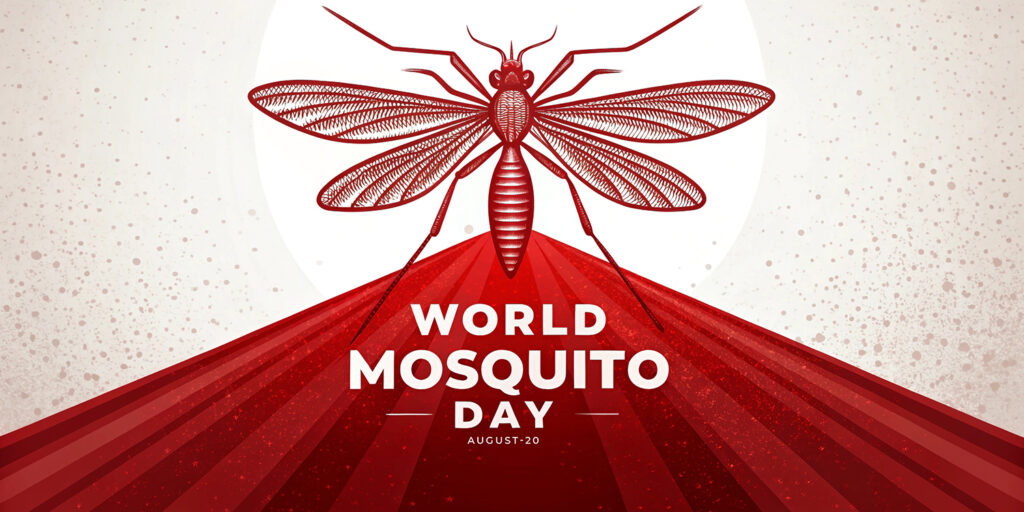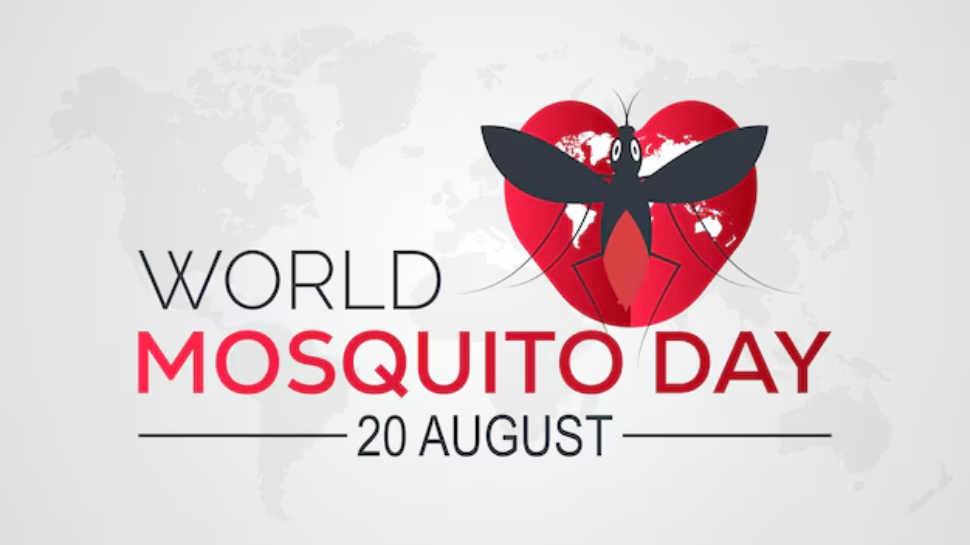A reminder on World Mosquito Day 2025
World Mosquito Day 2025 is observed on August 20 to remind us of the global health challenges caused by mosquitoes. While many people think of a mosquito bite as just a small red bump or an itchy patch that fades in a few days, the truth is far more serious. These tiny insects are among the world’s deadliest creatures, responsible for spreading diseases that affect millions of lives every year.

This day, first marked to honor the discovery of mosquitoes transmitting malaria, has now grown into a wider awareness campaign. In 2025, the focus is not only on malaria but also on the wide range of illnesses that mosquitoes carry, their impact on communities, and the urgent need for prevention.
Why mosquito bites matter more than we think
World Mosquito Day 2025- A mosquito bite happens when the female mosquito pierces the skin to draw blood for egg production. In the process, her saliva mixes with our blood, releasing proteins that prevent clotting. This triggers the body’s immune response, which explains the itching, redness, and swelling most people experience. For some, the reaction is mild. For others, it can mean larger welts, pain, or even allergic reactions.
The bite itself is uncomfortable, but the bigger danger lies in what mosquitoes can carry. They are vectors for viruses, parasites, and other pathogens that lead to illnesses ranging from short-term fevers to lifelong disability.
The diseases linked to mosquito bites
On World Mosquito Day 2025, doctors and health experts highlight the diseases that make mosquitoes a major global health threat.
Dengue fever rising across India
World Mosquito Day 2025- Dengue, spread by the Aedes aegypti mosquito, has become the most common mosquito-borne viral infection in India. It brings high fever, body pain, rashes, and in severe cases, internal bleeding. During monsoons, cases rise sharply because stagnant clean water in buckets, tanks, and pots provides breeding grounds.)
)
Malaria remains a risk
India has made strong progress in cutting down malaria cases, but risks remain in forested and tribal regions. Malaria is spread by the Anopheles mosquito and can cause recurring fever, chills, and organ complications if untreated. The government’s goal is to eliminate malaria by 2030, but continued vigilance is needed.
Chikungunya’s lasting pain
Another infection caused by Aedes mosquitoes, chikungunya, is infamous for its severe joint pain that can last for weeks or months. Though not usually fatal, the condition affects quality of life and can leave people bedridden for days.
Japanese encephalitis and brain risks
Japanese encephalitis, though less common, is dangerous because it affects the brain. Spread by Culex mosquitoes, the disease can lead to seizures, swelling of the brain, and long-term neurological damage. Vaccines are provided in high-risk areas of India, especially in the north and northeast.
Other infections still in focus
World Mosquito Day 2025- Zika virus remains on the radar, especially for pregnant women, because of its link to birth defects. Lymphatic filariasis, also known as elephantiasis, continues to burden parts of India, causing permanent swelling and disability. West Nile virus, though rare, has been reported in some states. These illnesses remind us that the threat of mosquitoes goes far beyond one or two well-known diseases.
Who faces the greatest risk?
Not everyone reacts the same way to mosquito-borne infections. Children are especially vulnerable because of weaker immune systems. Older adults and people with chronic illnesses may also face complications. Pregnant women are a high-risk group, particularly when exposed to infections like Zika. In some rare cases, even a normal mosquito bite can cause severe allergic reactions, known as skeeter syndrome, with swelling, fever, and pain.
Prevention is still the strongest protection
On World Mosquito Day 2025, health authorities remind us that prevention works better than treatment. Simple actions at home and in the community can save lives.
Keeping surroundings clean and dry is the most effective step. Emptying buckets, pots, and tanks weekly prevents mosquitoes from breeding. Using mosquito nets and window screens protects during sleep. Repellents, both natural and chemical, reduce bites indoors and outdoors. Large-scale public drives such as fogging, sanitation, and awareness campaigns add another shield of protection. Also Read: CCRAS and WHO-SEARO Jointly Host Regional Workshop on WHO-GMP for Herbal Medicines, Showcasing India’s Leadership in Quality Herbal Drug Standards: August 2025
A reminder for the future
As we mark World Mosquito Day 2025, it is clear that these insects are not just seasonal irritants. They remain one of the world’s deadliest threats, silently spreading infections that strain families and health systems alike. India has seen progress in tackling malaria and other mosquito-borne diseases, but continued prevention and awareness are essential to safeguard the future.

